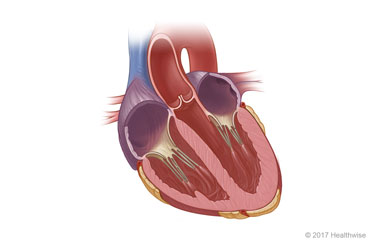Cardiac Arrhythmia: Care Instructions
Overview

A cardiac arrhythmia is a change in the normal rhythm of the heart. Your heart may beat too fast or too slow
or beat with an irregular or skipping rhythm. A change in the heart's rhythm may feel like a really strong
heartbeat or a fluttering in your chest. A severe heart rhythm problem can keep the body from getting the
blood it needs. This can result in shortness of breath, lightheadedness, and fainting.
You may take medicine to treat your condition. Your doctor may recommend a pacemaker or recommend catheter
ablation to destroy small parts of the heart that are causing a rhythm problem. Another possible treatment is
an implantable cardioverter-defibrillator (ICD). An ICD is a device that gives the heart a shock to return the
heart to a normal rhythm.
Follow-up care is a key part of your treatment and safety. Be sure to make and go to all
appointments, and call your doctor if you are having problems. It's also a good idea to know your test results
and keep a list of the medicines you take.
How can you care for yourself at home?
General care
|
|
|
|
|
-
Avoid infections such as COVID-19, colds, and the flu. Get a pneumococcal vaccine. If you have had
one before, ask your doctor if you need another dose. Get a flu vaccine every year. Stay up to date
on your COVID-19 vaccines.
|
|
|
|
Heart-healthy lifestyle
|
|
|
|
|
|
|
|
|
|
|
|
|
|
|
|
|
-
If you think you may have a problem with drug use, talk to your doctor. Certain drugs, such as
cocaine and methamphetamine, can speed up your heart's rhythm.
|
|
|
|

Activity
|
|
-
Get regular exercise. Try for 30 minutes on most days of the week. Ask your doctor what level of
exercise is safe for you. If activity is not likely to cause health problems, you probably do not
have limits on the type or level of activity that you can do. You may want to walk, swim, bike, or
do other activities.
|
|
|
-
When you exercise, watch for signs that your heart is working too hard. You are pushing too hard
if you cannot talk while you exercise. If you become short of breath or dizzy or have chest pain,
sit down and rest.
|
|
|
|
When should you call for help?
 Call 911
anytime you think you may need emergency care. For example, call if:
Call 911
anytime you think you may need emergency care. For example, call if:
Call your doctor now or seek immediate medical care if:
Watch closely for changes in your health, and be sure to contact your doctor if:
Current as of: June 24, 2023
Content Version: 14.0
Care instructions adapted under license by your
healthcare professional. If you have questions about a medical condition or this instruction, always ask
your healthcare professional. Healthwise, Incorporated disclaims any warranty or liability for your use of
this information.